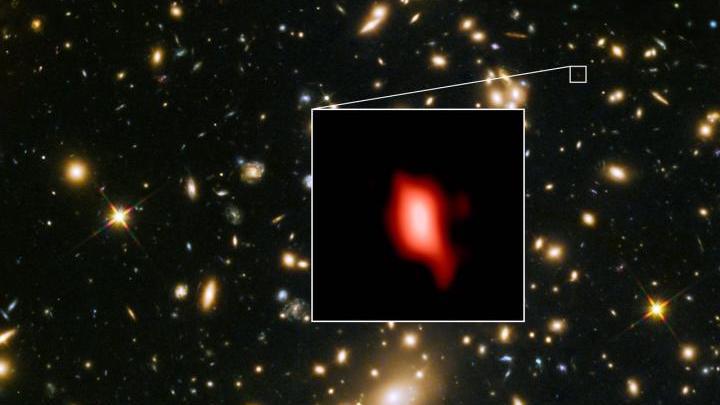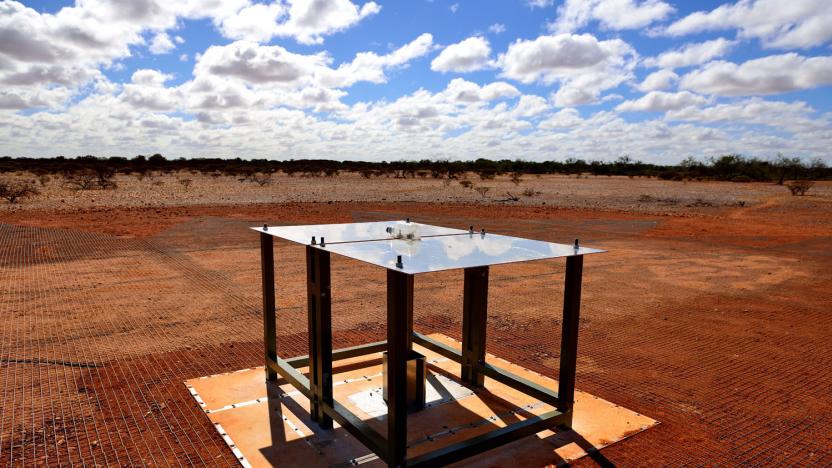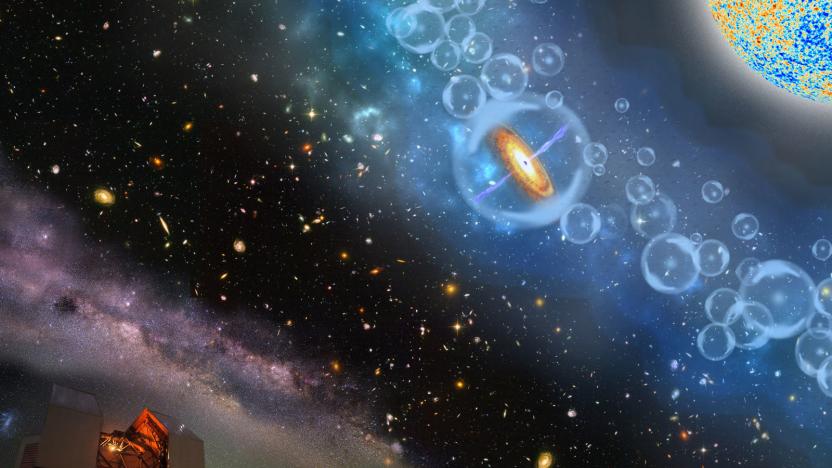bigbang
Latest

The first stars may have formed much earlier than scientists thought
After the Big Bang occurred, there was no oxygen in the early universe. Stars had to be born before oxygen could be created by fusion processes. When these stars died, the oxygen was released into the universe. Now, a research team using the ALMA telescope has found ionized oxygen in an early galaxy, MACS1149-JD1, that is dated just 500 million years after the Big Bang. This means that stars were created much, much sooner than previously thought.

Stephen Hawking’s last paper has been published on multiverse theory
The last paper Stephen Hawking wrote before he died has now been published in the Journal of High Energy Physics. Though some version of the paper has been available on the preprint site arXiv since last year, it was submitted to the journal for review just days before Hawking passed, and it deals with some theoretical physics about the many universes that might have been created by the Big Bang.

Researchers may have detected signals from the universe’s first stars
The early development of our universe is still quite a mystery, but in a new study published today in Nature, researchers describe what may be evidence of when the first stars began to form. After the Big Bang, which took place some 13.7 billion years ago, the universe was dark, hot and full of high-energy particles. Photons couldn't survive, but after around 380,000 years, the universe cooled enough to allow light to actually stick around. That's when the cosmic microwave background (CMB) came to be. It's our universe's first surviving radiation and researchers have looked to it in order to learn more about the earliest years of our universe.

Farthest-ever supermassive black hole reveals the early universe
Quasars are supermassive black holes at the center of galaxies that actively consume gas and dust. As mass falls into the black hole, it forms an accretion disk around the black hole and jets of matter that spew from the black hole. These features make quasars some of the brightest objects in the universe. And now, scientists have discovered the most distant supermassive black hole ever observed, which is within a quasar. Findings will be published in the journal Nature.

Astronomers just measured a whole lot more than gravitational waves
A couple of weeks ago, the LIGO (Laser Interferometer Gravitational-Wave Observatory) and Virgo teams announced the detection of another set of gravitational waves -- the fourth since LIGO's first detection in September of 2015. The observations of these ripples in spacetime are extraordinary in and of themselves, no matter how many times we record them. However, while the first three sets of gravitational waves recorded were by the two LIGO observatories, the fourth was also detected by a newly established third -- Virgo -- located in Italy. And having three detectors allows researchers to triangulate the source of those waves with extraordinary precision.

Green-hot galaxies reveal clues to the ancient universe
Galaxies that emit a green glow make bitchin' screen-savers, but they're exceedingly rare in the actual universe. However, UCLA astronomers recently discovered that most, if not all early galaxies had a green hue due to their intense heat and special chemistry. "The discovery that young galaxies are so unexpectedly bright [with green light] ... will dramatically change and improve the way that we study galaxy formation throughout the history of the universe," said UCLA physics Professor Matthew Malkan in a statement.

Take a 360-degree video tour of CERN's Large Hadron Collider
CERN's Large Hadron Collider keeps delivering important scientific discoveries, but apart from some Google Street View images, it's pretty hard to grasp the scale of it. However, a new 360-degree video from the BBC (below) takes you on a visual tour of the world's largest machine. At up to 4K resolution, you can see parts of the 27 km (16 mile) tunnel where particles fly by at the speed of light in both directions. It also shows the Compact Muon Solenoid detector that looks for dark matter, extra dimensions and the Higgs Boson. The science is mind-bending, but as the video shows, the machine needed to test it is equally so.

The Hubble has seen farther back in time than ever before
NASA announced on Thursday that an international team of astronomers have used the Hubble space telescope to spot the most distant galaxy discovered to date -- not to mention one of the oldest in the visible Universe. The galaxy, dubbed GN-z11, has a measured redshift of 11.1, meaning it formed just 400 million years after the Big Bang.

Gravitational waves are our window into the early universe
"We have detected gravitational waves. We did it," David Reitze, executive director of the Laser Interferometer Gravitational-Wave Observatory (LIGO), said at a press conference in Washington on Thursday. Reitze has good reason to be excited. LIGO's find is a huge, Nobel Prize-worthy accomplishment on par with CERN's discovery of the Higgs particle in 2012. Just as Higgs particles revolutionized the standard model of physics, gravitational waves are set to do the same to Einstein's theory of general relativity. Simply put, it will fundamentally alter how we view and interact with the universe around us.

See Neil deGrasse Tyson explain the universe in 8 minutes
Need proof that Neil deGrasse Tyson has a knack for explaining complex astrophysical concepts in simple terms? You don't have to spend the better part of an hour watching a Cosmos episode -- in fact, a short work break will do the trick. The famed astrophysicist has posted a video explaining the basic history of the universe within 8 minutes, ranging from the Big Bang to humanity itself. The clip notes that many things we take for granted (such as gravity and the prevalence of matter) were decided in the earliest moments of the universe, and that our Solar System largely exists thanks to giant stars ejecting heavy elements. That sounds like a lot to take in, but don't worry: this is quite accessible, and it's a good primer on the nature of... well, everything.

Cosmic dust definitely clouded Big Bang researchers' findings
Earlier this year, researchers at the Harvard-Smithsonian Center for Astrophysics and the BICEP2 telescope in Antarctica were thought to have found evidence of gravitational waves produced during the first moments of the big bang. The discovery was heralded as one of the most important discoveries of our era -- unfortunately, the results were contaminated. While going through peer-review, astronomers began to wonder if cosmic dust may have skewed the results. Now the verdict is in: it did, but that doesn't necessarily mean the theory is false.

Big Bang researchers aren't so sure they have proof of cosmic ripples
Remember that evidence of the early gravitational waves formed by the Big Bang? Apparently, it's not as surefire as scientists once thought. The newly peer-reviewed findings note that there's "unquantifiable uncertainty" in the source data; cosmic dust in the astronomers' map of the universe may have skewed the results. More recent mapping efforts also suggest that there might have been a false signal.

Planck space telescope retires from observing the early universe
After nearly 4.5 years of watching the stars, the Planck telescope is officially out of action. European Space Agency scientists have shut off the observation satellite now that it has both finished its mission and parked in a "permanent hibernation" orbit around the Sun. The telescope accomplished a lot during that short lifespan, however -- by creating a detailed map of cosmic background radiation, Planck gave us a snapshot of the early universe that will help us understand the evolution of space. Researchers still haven't finished studying Planck's findings, which suggests that the spacecraft's legacy will last well beyond the final transmission.

CERN confirms existence of new particle consistent with Higgs boson (video)
Physics' big announcement had more in common with a leaky product launch than the serious business of re-writing the science books. But slack asset management aside, it's official: a new boson has been observed with a standard deviation of 5 (confidence of 99.9%). The highly anticipated announcement came this morning direct from CERN's press conference (via ICHEP in Melbourne,) and is the result of an intense, ongoing search for the elusive particle. The observation is of a boson particle with a mass of 125.3 ± 0.6 GeV, at a significance of 4.9 sigma. Joe Incandela -- giving the presentation -- said that this is "In agreement with the standard model at 95% confidence range." The boson is the heaviest ever found, and although this is still a preliminary result, it's by far the strongest case yet for the existence of the elusive Higgs. The sought-after particle is essential for supporting the current understanding of sub-atomic world, and its bearing on nuclear, and electromagnetic interactions. The next stage will be to determine the exact characteristics of the new particle and whether it matches the expectations of the Higgs, or is it in fact something more "exotic." This part will take much more time, but for now, a (very) small, but important piece of the puzzle has been found. Update: We're sure you've got many questions, and CERN apparently anticipated this. Check out the more coverage link for a helpful FAQ about everything Higgs. [Image credit: CERN]

Alma observatory captures stars being born, reports back on universe's awkward teenage years
A baby book for our cosmos? That'd be a happy by-product of the massive insight star-gazing scientists are set to glean from Alma -- the telescope responsible for ushering in a "new golden age of astronomy." The Atacama large millimeter/submillimeter array (as it's known in long form), located 3,000 meters above sea level on a Chilean plateau, goes beyond the voyeuristic powers of current optical telescopes, delivering detailed imagery of the dense gas clouds that birth baby stars. Why is this significant? Well, using the complex 20-antenna strong array (a total of 66 are planned), astronomers from North America, Europe and Japan will get a first-hand glimpse of the gaseous mix that was our universe a few hundred million years post-Big Bang. Consider the research a time-traveling peek back into the formative years of existence. Heady stuff, yes, but the array won't have its multiple, celestial-focused eyes trained solely on star nurseries; scientists from around the globe already plan on getting an up close look at the Sagittarius A black hole. When these "Pyramids of the 21st Century" finish construction in 2013, we'll be just one step closer to viewing the limits of our cosmic fishbowl.

Galaxy cluster research supports Einstein's Theory of Relativity on a cosmic level
In one small win for Einstein, one giant win for mankind, scientists at the Niels Bohr Institute have proved his General Theory of Relativity on a cosmic scale through their research of large galaxy clusters. Accordingly, the clusters -- which are the largest known gravity-bound objects -- have such a strong pull that they should cause light to "redshift," or proportionally increase in wavelength, shifting towards the red end of the visible spectrum. To test it, researchers measured beams from 8,000 clusters, revealing that they do indeed cause a change in light's wavelength, supporting Einstein's theory to a T. One good turn deserves another, right Albert? Armchair cosmologists can hop on over to the source link to learn more.

LG G-Slate spotted in Korean music video, 3D cameras and all?
Oh LG, did you really think you could slip an entire tablet past the eagle-eyed gadget obsessives of Korea? The G-Slate has been one of the more mysterious devices launched at CES this year, but it now appears to have shaken off some of its shyness and made a cameo appearance on K-Pop star Seungri's latest music vid. Our Korean correspondents inform us that Seungri's band Big Bang has had a relationship with LG since the introduction of the cheap and cheerful Lollipop handset (video evidence after the break), so it's not unreasonable to believe this young chap has an inside line on LG's upcoming hardware. His video shows an LG-branded slate at 0.53 and 1.52, and although we get only brief glimpses, one of them suggests a dual-camera array on the back, which seemingly corroborates earlier rumors of the G-Slate bringing some 3D voodoo to the market. Skip the break and see for yourself. [Thanks, Alan Yi]

Large Hadron Collider wants to make mini Big Bangs, Sheldon and Leonard disapprove
The Large Hadron Collider has been busily colliding protons since it opened last year, but a new set of experiments starting later this month could tell us more about the beginnings of the universe than we've ever known before. At CERN, where the LHC is housed in Geneva, scientists will attempt to create mini Big Bangs (the full-sized one is generally accepted as having created the actual universe about 13.7 billion years ago). The process will involve shooting lead ions through the 17-mile long collider, and accelerating them to relativistic speeds before colliding them head-on with protons. According to popular wisdom this should cause an explosion resulting in the creation of brand spanking new particles. Although similar experiments have been conducted on a much smaller scale at the Relativistic Heavy Ion Collider, this will be the first time scientists have attempted to accurately recreate conditions exactly like the Big Bang. Hit the source link for the full story.

Planck telescope maps the universe in search of primordial light
Yep, that innocuous-looking picture above is the whole freaking universe, as perceived by the Planck telescope -- a long-wave light detector that's been catapulted into space to search for Big Bang clues. The European Space Agency is using it in order to get the most precise information to date on Cosmic Microwave Background radiation (apparent in the image as the magenta and yellow mush in the, ahem, background), which could in turn enlighten us on the conditions that gave rise to all of us omnivores prowling a gravity-assisted, ozone-protected, floating rock. The first mapping run took just over six months to complete, but the plan is to produce four such images using the Planck's super-cold (nearly at absolute zero) sensors before retiring the thing. Results are expected no sooner than 2013, so please do slide back from the edge of your seat.

Large Hadron Collider reboots, makes first protonic bang!
Yes, ladies and gentlemen, that most epic triumph of human engineering and physics research has finally taken place, and strangely enough our planet's still in one piece too. The search for the Higgs boson particle resumed yesterday, somewhere under the Franco-Swiss border, with the CERN research team successfully executing what the LHC was built to do -- accelerating proton beams to nearly the speed of light, then filming the wreckage as they crash into each other. Having encountered a number of bumps in the road, the researchers have had to significantly scale down the energy at which their early collisions will take place, with the very first ones said to have happened at 900 billion electron volts. Still, plans are afoot for an imminent shift up to 1.2 trillion electron volts (TeV), which would be the highest energy level any particle accelerator has achieved yet, before a ramp up to 7 TeV over the coming year if all goes well.








